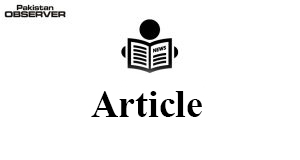IQBAL KHAN
NEW York Times has reported that “As Corona Vi rus cases dwindle in China, after its sprawling ef fort to get a seemingly unstoppable outbreak under control, the country is turning its attention to others around the world— giving Beijing a chance to reposition itself as the global leader in a time of crisis”. China has despatched medical aid and donated money to combat the disease. “China has stepped into a role traditionally reserved for the US, showcasing its model after failures in European and American responses; it’s indeed a remarkable turn”. And when worst was over for China—having observer status in South Asia Association for Regional Cooperation (SAARC)—Prime Minster Narendra Modi woke up to fight Corona via SAARC, with an intent to divert attention from confirmedCovid-19 casesin Srinagar. And with paltry US$ 10 million fund he was seen showcasing his ‘global’ stature. For comparison, Pakistan has made an initial allocation of US$ 600 million for its national plan. President Donald Trump has allocated US$ 46 billion for handling the disease within the US. Direct and indirect global costs to combat Covid-19 could soon touch a trillions dollar mark. One wonders if Modi has any clue about the gravity of crisis. India West reported: Panic gripped Srinagar city on March 19 with residents indulging in heavy panic buying of essentials oflife after a womantested positive forCovid19.“People thronged markets for edible oils, pulses, tea, spices, medicines, hand-washes and sanitizers. Shopkeepers were battling with the rush of buyers as their shelves started getting emptied very quickly.” “Long queues of motorists lined outside various petrol filling stations in Srinagar and other parts of the Valley indicate that petroleum products would also run into short supply.” Restrictions have been imposed in Jammu and Kashmir following the Indian government’s move to revoke Article 370 of the Constitution, on 5 Aug that accorded special status to the region. Ever since, medical and logistical capacities of Indian occupied Kashmir have shrunk exponentially. During the SAARC conference, Pakistani side was represented by ZafarMirza, StateMinister for Health, who in his address at the conference, said that it was imperative that the lockdown in Kashmir be lifted in view of the health emergency after the Corona Virus outbreak. “It is a matter of concern that Covid-19 has been reported from Jammu and Kashmir. In view of the health emergency, it is imperative that all lockdown in the territory must be lifted immediately,” Mirza said at the conference. “Opening up communications and movement will facilitate the dissemination of information, allow distribution of medical supplies and enable containment and relief efforts to proceed unimpeded,” he added. SAARC meeting onCovid-19 confirmedthat Indiaisn’t anything beyond atypicalthird world developing country with a leadership beset with of parochial inclinations. India is nowhere close to China’s magnanimity. Conference was more of a grandstanding occasion minus the networking.And comically with this showmanship, Modi thought India had assumed leadership of the South Asian charge against Covid-19. Given how irrelevant the SAARC has become of late, the video conference served more as a diplomatic bolster rather than an actual organisational meeting. Ample negatives were on show. India’s assistance package didn’t commensurate with its big power claims. It didn’t look very good when one of the world’s major pharmaceutical hubs India did not offer significant assistance in the form of drugs, masks and ventilators. China is supplying masks and medicines to both Iran and Italy. And China is not seen showcasing its service to Mankind in a cheap way, through any forum.All SAARC member states agreedthat a coordinated and joint effort was needed to tackle the pandemic. Pakistan rightly wantedthe SAARC Secretariat, based in Kathmandu, to lead the fight instead of India. Modi’s initiative came as a surprise to many given the fact that New Delhi, since Modi’s rule, has tried to sideline the grouping as part of its strategy to isolate Islamabad and have a variant of SAARC minus Pakistan. It is because of this reason that the SAARC summit scheduled in November 2016 in Islamabad could not take place. Pakistan accepted the offer acknowledging that the threat of Covid-19 required coordinated efforts at regional and global levels. And by lower echelon representation Pakistan maintained a fine balance in its approach toward Modi’s misplaced hubris. South Asia needs to prepare for the eventuality of the exponential spread of the virus, if the outbreak gets past the current stageand recordscommunitylevel spread.The number of hospital beds as well as other medical equipmentlike ventilators would become insufficient in such a scenario. Making an accurate assessment of such requirementsin advance would mitigate the pressures. Covid-19 pandemic is a global health emergency,thelikes of which have not been witnessed in the past century; however, it is deemed ‘controllable’aswell.WorldHealthOrganization’s four-pronged advice offers a reasonable way forward, namely: preparation and readiness; detection, prevention and treatment; reduction and suppression; andinnovation andimprovement. Pakistan is following a comprehensive national action plan to counter the menace. Pakistan has been involved in containment efforts right fromthe outset ofthe outbreak. Prime Minister Imran Khanis personally overseeingthese efforts, highlightingthe steps Pakistantookto controlthe pandemic. Pakistan has been matching its measures to real-time threat assessments. While stressing the need for caution, it has advised its people against panic. So far, Pakistan has managedto containCovid-19to a reasonable extent, an achievement the WHO has recognized and commended. SAARC could adapt some of best practices out of Pakistan’s model. —Thewriteris a freelance columnistbased in Islamabad










